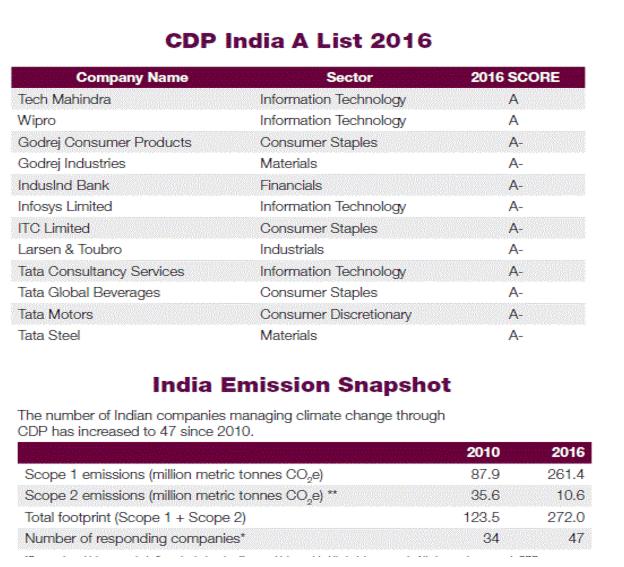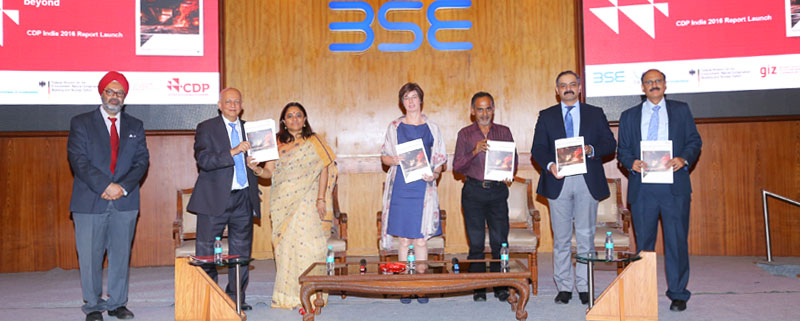Over 80% of the companies responding to CDP India (Carbon Disclosure Project India) have voluntarily set up emission reduction targets, a trend observed in line with their global peers that have begun the transition to a low-carbon economy and some are already capitalizing on the opportunities this affords. A fair number of companies also risk being left behind through lack of long-term planning and inertia, according to analysis released today by CDP, the not-for-profit global environmental data platform.
On the positive side, Wipro, Indian IT bell weather company saw growth of 15% over a five-year period alongside a 24% drop in emissions, with overall emissions intensity falling by 33%. The company has introduced new virtualisation technologies across its servers, resulting in huge annual energy savings. Other Indian majors that have demonstrated a decoupling of emissions and growth are Tata Motors and ITC Ltd.
The research for the report demonstrates companies are one of the key actors in enabling the global economy to achieve its climate goals and the global report reveals that 85% of businesses already have at least one target in place to reduce their greenhouse gas emissions. However, these targets are lacking in long-term ambition, with just 14% of companies having set goals for 2030 or beyond. Moreover, just a small proportion of companies in the sample (9%) have committed to aligning their targets with the latest climate science for a 2°C pathway. It is encouraging that Wipro, Tech Mahindra and Aditya Birla Chemicals, have set science-based targets.

(ADEC Innovations were CDP India’s scoring partner).
With the ratification, India has set ambitious targets for itself, the boldest one being 33-35% reduction in greenhouse gas (GHG) emissions per unit of GDP, especially given the development priorities. This demonstrates India’s commitment that 300 million people in India still live have no access to electricity.
“We are enthused to note that the quality of disclosure and efforts by Indian companies are improving year on year. Especially noteworthy is the fact the companies are adopting science-based targets. There is clearly hope and we encourage companies to do more which will future-proof the growth trajectory,” said Damandeep Singh, Director, CDP India.
Sangeeta Prasad, CEO, IC & IC, Mahindra Lifespace Developers Ltd said, “It is heartening to see India’s private sector play an increasingly meaningful role in reducing its carbon footprint. At Mahindra Lifespaces, we are focused on actively furthering the cause of sustainable urbanisation and are continually working towards augmenting our contribution to India’s INDC (Intended Nationally Determined Contribution).”
Carbon Disclosure Project India (CDP India) and Environmental Resources Management (ERM) have jointly developed the India Climate Change Report 2016. In 2016, 58 Indian companies responded to the CDP Questionnaire, of which 47 were among BSE Top 200. The total reported emissions from unique reporting companies are 272 million tCO2e. The key trends that emanate from this year’s report, include:
- Increasing focus on setting emission reduction and renewable energy targets
- Regulations continue to be perceived by businesses as a risk and an opportunity
- Companies are setting an internal price on carbon
- Increasing awareness on data quality and assurance
CDP and Carbon Disclosure Project India, are not-for-profit organizations providing the global system for companies, cities, states and regions to measure, disclose, manage and share vital information on their environmental performance. Some 5,800 companies, representing close to 60% global market capitalization, disclosed environmental information through CDP in 2016. CDP now holds the most comprehensive collection globally of primary corporate environmental data and puts these insights at the heart of strategic business, investment and policy decisions.
Thank you for reading the story until the very end. We appreciate the time you have given us. In addition, your thoughts and inputs will genuinely make a difference to us. Please do drop in a line and help us do better.
Regards,
The CSR Journal Team


